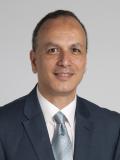Medhat Askar, MD, PhD, MSHPE, FRCPath, D(ABHI), D(ABMLI), HCLD(ABB)

Medhat Askar is a Professor of Pathology and Laboratory Medicine at Texas A&M College of Medicine, the Director of Transplant Immunology and Assistant Hematopoietic Cell Processing Facility Laboratory Director at Baylor University Medical Center, Dallas, TX, USA. After completing his MD and PhD (Cairo, Egypt) he trained in transplant immunology at Thomas Starzl Transplantation Institute (Pittsburgh, PA). He is board certified by the American Board of the Histocompatibility & Immunogenetics, the American Board of Medical Laboratory Immunology and the American Board of Bioanalysis. He is also a fellow of the Royal College of Pathologists (London, UK). Dr. Askar is the President of The American Board of Histocompatibility and Immunogenetics (ABHI), President-Elect of The American Society for Histocompatibility and Immunogenetics (ASHI) and a member of the National Boards of Directors of United Network for Organ Sharing (UNOS) and Organ Procurement and Transplantation Network (OPTN). He is also a Councilor to The Transplantation Society (TTS) representing North America, the Co-Chair of TTS Education Committee and a project leader for the Next Generation Sequencing (NGS) in the 18thInternational HLA and Immunogenetics Workshop that will be held in Amsterdam, Netherlands in 2021. Dr. Askar is a member of the Laboratory Practice Committee of the International Society of Cell and Gene Therapy and a principle Investigator on a number of study protocols through the Center for International Blood and Marrow Transplant Research (CIBMTR).
Financial relationships
**Disclaimer**
This Continuing Medical Education (CME) Learning Management System, Ethos, includes individuals designated as 'faculty' for CME purposes. Please note that the term 'faculty' refers solely to their role as a contributor/planner within a CME activity and does not imply any formal affiliation with UT Southwestern Medical Center (UTSW). The display of names and credentials is intended for educational purposes only and does not necessarily indicate a professional or academic relationship with UTSW. Participants are encouraged to verify the affiliations and credentials of faculty members independently if further clarification is needed.

 Facebook
Facebook X
X LinkedIn
LinkedIn Forward
Forward